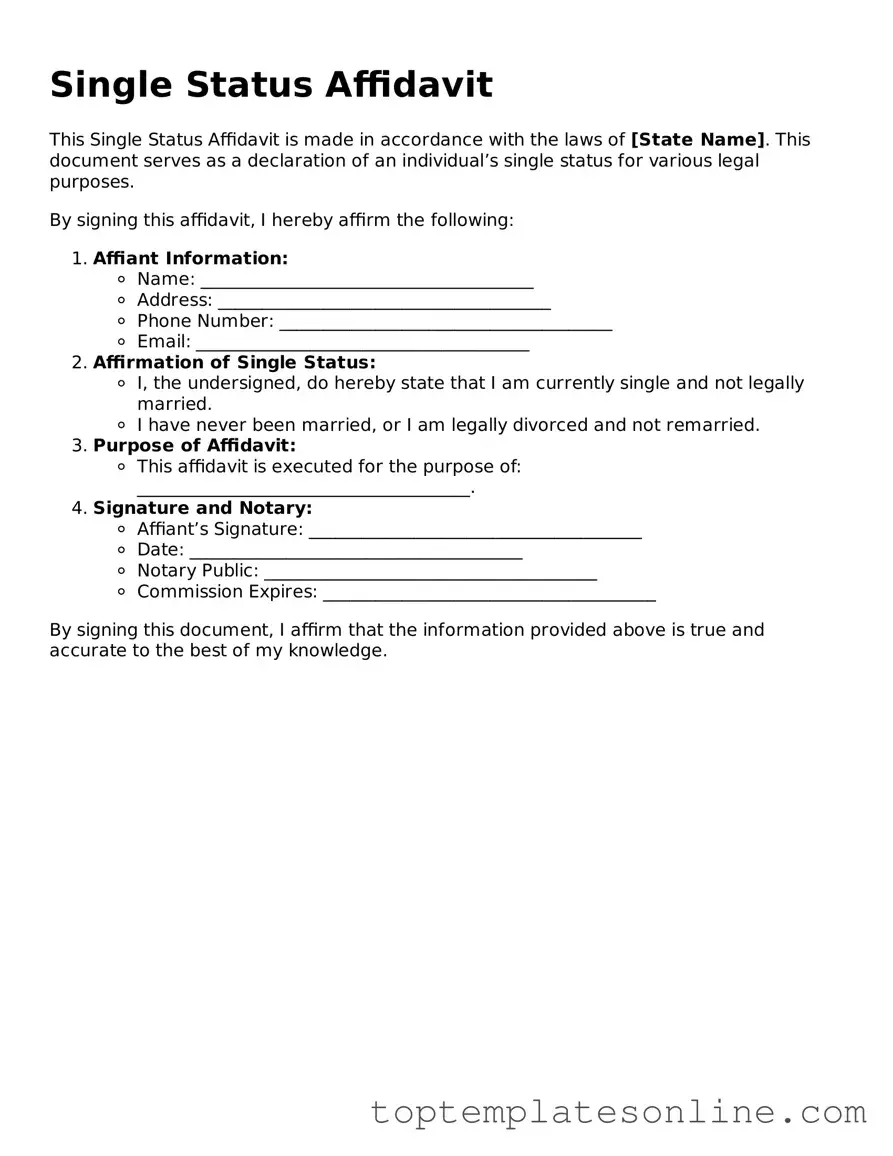Attorney-Approved Single Status Affidavit Form
The Single Status Affidavit is an important document for individuals seeking to affirm their single status, particularly when planning to marry abroad. This form serves as a legal declaration that a person is not currently married, which is often required by foreign authorities to ensure compliance with local marriage laws. Completing the affidavit typically involves providing personal details such as name, date of birth, and residence, along with a sworn statement affirming one's single status. Additionally, some jurisdictions may require notarization or other forms of verification to lend credibility to the affidavit. Understanding the requirements and implications of this form is essential for anyone navigating the complexities of international marriage, as it helps to prevent legal complications and ensures a smooth transition into a new life chapter. Moreover, individuals must be aware of the specific regulations in both their home country and the country where they intend to marry, as these can vary significantly.
Find More Types of Single Status Affidavit Templates
Free Printable Affidavit of Identity - Sometimes, the affidavit is necessary for employment verification processes.
Completing the necessary paperwork to confirm your residency can be a straightforward process, especially when utilizing resources like the Letter of Residency, which provides guidance on filling out the South Dakota Affidavit of Residency form accurately.
Common mistakes
-
Inaccurate Personal Information: Many individuals mistakenly enter incorrect details such as their name, date of birth, or address. This can lead to delays or complications in processing the affidavit.
-
Failure to Notarize: Some people forget to have their affidavit notarized. A notary public’s signature is often required to validate the document, and without it, the affidavit may not be accepted.
-
Omitting Required Signatures: It’s essential to ensure that all necessary parties sign the affidavit. Neglecting to obtain a signature from a witness or co-signer can render the document invalid.
-
Incorrect Use of Language: Using ambiguous or unclear language can lead to misunderstandings. It’s important to be precise and straightforward when filling out the form to avoid any potential issues.
-
Not Checking for Updates: Laws and requirements can change. Failing to verify that you are using the most current version of the Single Status Affidavit form may result in submitting outdated information.
Guide to Writing Single Status Affidavit
Once you have the Single Status Affidavit form in hand, you are ready to begin the process of filling it out. This form typically requires personal information and may need to be notarized. Make sure you have all necessary documents and identification ready to ensure a smooth completion.
- Start by entering your full name at the top of the form. Make sure to use your legal name as it appears on your identification.
- Provide your date of birth. Write it in the format requested, typically MM/DD/YYYY.
- Next, fill in your current address. Include street number, street name, city, state, and ZIP code.
- Indicate your marital status. You will usually check a box or write "single" in the designated area.
- If required, provide details about your previous marriages. Include the names of former spouses and dates of divorce, if applicable.
- Sign the form in the designated area. Your signature confirms that the information you provided is accurate.
- Find a notary public to witness your signature. They will typically require identification to verify your identity.
- After notarization, make copies of the completed form for your records before submitting it as needed.
Documents used along the form
The Single Status Affidavit is often accompanied by various other forms and documents that help establish a person's marital status for legal purposes. Below is a list of commonly used documents that may be required alongside the Single Status Affidavit.
- Marriage License Application: This document is submitted to the local government to request a marriage license. It typically requires personal information from both parties, including identification and proof of residency.
- Identification Documents: Valid forms of identification, such as a driver's license or passport, are usually required. These documents verify the identity of the individuals involved.
- Divorce Decree or Death Certificate: If applicable, individuals may need to provide a copy of their divorce decree or a death certificate of a former spouse to prove that they are legally free to marry.
- Affidavit of Identity: This document confirms the identity of the individual and is essential when presenting the Single Status Affidavit, especially when verifying the information provided on generalaffidavit.com.
- Witness Statements: Some jurisdictions may require statements from witnesses affirming the single status of the parties involved. These statements can support the claims made in the affidavit.
- Residency Affidavit: In certain cases, a residency affidavit may be needed to confirm that at least one party meets the residency requirements for marriage in the state.
- Application for Certificate of No Impediment: This document may be required in some states or countries to confirm that there are no legal barriers preventing the marriage, often used for international marriages.
Gathering these documents can streamline the process of obtaining a marriage license and ensure compliance with local laws. Always check with local authorities for specific requirements in your area.
